| Srl | Item |
| 1 |
ID:
154037
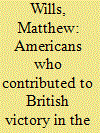

|
|
|
| 2 |
ID:
153991
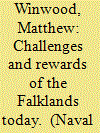

|
|
|
| 3 |
ID:
127390
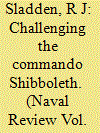

|
|
|
| 4 |
ID:
140905
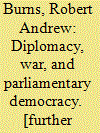

|
|
|
|
|
| Publication |
Lanham, University Press of America, 1985.
|
| Description |
52p.pbk
|
| Standard Number |
0819146102
|
|
|
|
|
|
|
|
|
|
|
|
Copies: C:1/I:0,R:0,Q:0
Circulation
| Accession# | Call# | Current Location | Status | Policy | Location |
| 027000 | 997.11/BUR 027000 | Main | On Shelf | General | |
|
|
|
|
| 5 |
ID:
127359
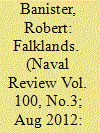

|
|
|
| 6 |
ID:
084348
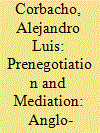

|
|
|
|
|
| Publication |
2008.
|
| Summary/Abstract |
This paper studies the process of prenegotiation and the role of mediators between the Argentine and British governments concerning the sovereignty dispute of the Falkland/Malvinas Islands between 1982 and 1990. During this period, the relationship between both governments evolved from rupture and norelations to an agreement on the conditions to negotiate the renewal of full diplomatic relations which was concluded in early 1990. In a preliminary process of prenegotiation, the governments of Switzerland, initially, and the United States played a role in helping to reach an agreement. The former failed when the talks ended abruptly in July 1984. The latter succeeded in getting both parties to the table and keeping them there, thus avoiding a potential rupture until the two parties reached an agreement in principle. During the prenegotiation stage, the principal parties were able to reduce the risks of escalation; they defined and narrowed the boundaries of the dispute, clearly identified the trade-offs, and structured the agenda of formal negotiations. Consequently, the likelihood of successful negotiation improves significantly when the parties reach an agreement during prenegotiation on what will be discussed later. This case also illustrate that sometimes, when negotiations reach a point of stalemate, a mediator can help to find a "zone of agreement." When this situation occurs, the degree of involvement and the resources of the mediator are particularly important. Finally, this case confirms the assertions that effective mediation is more a matter of leverage and influence than a matter of impartiality.
|
|
|
|
|
|
|
|
|
|
|
|
|
|
|
|
| 7 |
ID:
114980


|
|
|
|
|
| Publication |
2011.
|
| Summary/Abstract |
Did Britain reinvade the Falklands because of its 'identity'? Or was reinvasion instead required by its 'role' in international politics? In this article I show that a complete constructivist explanation of Britain's response must consider both its identity affirmation, which constructivist International Relations (IR) theory would certainly draw attention to, but also the role it played on the world stage at the beginning of the 1980s, which would very likely be overlooked. I show that a solely identity-based explanation is incomplete and ultimately unpersuasive since identities are affirmed by playing social roles, which give identity meaning. In 1982, a number of roles could have fulfilled this function for Britain; it is important then that Britain chose and was able to play the role of a status quo oriented power rather than that of a colonial power. Beyond offering a more complete interpretation of the events, the article clarifies the links between roles, identity, and action in international politics, and the type of theory appropriate to such analysis.
|
|
|
|
|
|
|
|
|
|
|
|
|
|
|
|
| 8 |
ID:
123466


|
|
|
| 9 |
ID:
127242
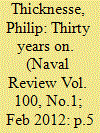

|
|
|